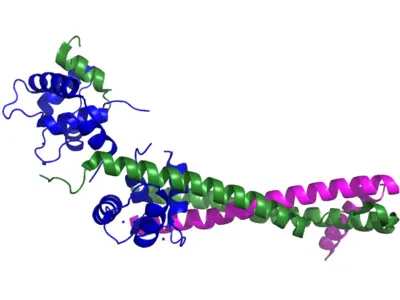cTnI (Cardiac Troponin I) in Veterinary Diseases: A Vital Diagnostic Tool
cTnI (Cardiac Troponin I), is an antigenic protein present only in cardiac muscle tissue. It acts as a cardiac troponin that is cardiac injury biomarker in human and veterinary practice because it is used in the diagnosis of myocardial infarction, heart failure, and cardiomyopathies.
| Catalog No. | Products Name | Detected Species | Products Information |
| GMP-BOV-cTnI-Ag | cTnI | Bovines/Cattle | Details |
| GMP-BOV-cTnI-Ab | Anti-Bovine cTnl monoclonal antibody (mAb) | Bovines/Cattle | Details |
| GMP-CAN-cTnI-Ag | cTnI | Dog/Canine | Details |
| GMP-CAN-cTnI-Ab | Anti-Canine cTnl monoclonal antibody (mAb) | Dog/Canine | Details |
| GMP-EQU-cTnI-Ag | cTnI | Equine/Horse | Details |
| GMP-EQU-cTnI-Ab | Anti-Equine cTnl monoclonal antibody (mAb) | Equine/Horse | Details |
| GMP-FEL-cTnI-Ag | cTnI | Cat/Feline | Details |
| GMP-FEL-cTnI-Ab | Anti-Feline cTnl monoclonal antibody (mAb) | Cat/Feline | Details |
Validation Data
GeneMedi's feline cTnI antibodies exhibit superior performance in sandwich immunoassays.
GeneMedi’s GMP-FEL-cTnI-Ab01, GMP-FEL-cTnI-Ab02, and GMP-FEL-cTnI-Ab05 demonstrate superior performance in sandwich ELISA assays. We tested four antibody pairs, and the GMP-FEL-cTnI-Ab01 and GMP-FEL-cTnI-Ab02 pair showed the lowest EC50. Based on these results, we recommend this antibody pair for optimal performance in cTnI detection.
Figure 1. The performance of GeneMedi’s feline cTnI antibodies in sandwich ELISA assays.
A-B. Results of four different antibody pairs in sandwich ELISA assays.
C. Antibody pairs and their EC50 values.

Decoding cTnI: The Essential Heart Health Marker for Pets
Cardiac Troponin I (cTnI) is a protein which is expressed on cardiac muscles’ cell and is an active participle in muscle contraction. As for veterinary medicine, it is significant to state that cTnI is considered as a specific and sensitive biomarker for confirming the presence of Myocardial, aka cardiac muscle, injury in numerous animal species, such as dogs, cats, horses and others.

Navigating Cardiac Conditions: Diseases Identified Through cTnI in Animals
When heart muscle cells sustain damage, cardiac troponin I (cTnI) is released into the bloodstream, serving as a valuable diagnostic tool for evaluating cardiac health. Elevated levels of cTnI in the blood indicate myocardial damage, which can stem from various cardiac conditions such as myocardial infarction (heart attack), myocarditis (heart muscle inflammation), cardiomyopathy (heart muscle disease affecting size, shape, and structure), direct heart injury due to trauma, or systemic diseases impacting the heart indirectly.
The significance of measuring cTnI extends beyond diagnosing cardiac conditions; it also aids in prognostic assessments, enabling veterinarians to predict the potential outcome of cardiac injury and guide treatment decisions. Research has demonstrated a correlation between elevated cTnI levels and the severity of heart disease in dogs and cats, facilitating the management of conditions like congestive heart failure.
In clinical practice, cTnI levels are typically assessed through blood tests utilizing immunoassay techniques tailored for sensitivity to this specific cardiac biomarker. Due to its specificity for cardiac tissue, cTnI offers a more direct indication of heart muscle damage compared to other nonspecific markers of injury or stress, rendering it a critical component of veterinary diagnostics for pets suspected of having heart disease.
| Animals | Normal Range | Possible Diseases Listed | Specimens/Biofluids | Measurement Method |
|---|---|---|---|---|
| Dog | <0.1 ng/mL | Dilated cardiomyopathy, Myocarditis, Congestive heart failure, Myocardial infarction (rare in dogs), Trauma to the chest, Hypertrophic cardiomyopathy, Systemic hypertension, Pulmonary hypertension, Arrhythmias, Sepsis-induced myocardial damage | Blood | Immunoassay |
| Cat | <0.1 ng/mL | Hypertrophic cardiomyopathy, Myocarditis, Arterial thromboembolism, Congestive heart failure, Hyperthyroidism with secondary heart effects, Systemic hypertension, Pulmonary hypertension, Sepsis-induced myocardial damage, Trauma to the chest, Arrhythmias | Blood | Immunoassay |
| Horse | - | Atrial fibrillation, Myocarditis, Exercise-induced myocardial damage, Congestive heart failure, Trauma to the chest, Systemic infections affecting the heart, Valvular heart disease, Pulmonary hypertension, Arrhythmias, Sepsis-induced myocardial damage | Blood | Immunoassay |
| Cattle | - | Myocarditis, Traumatic reticuloperitonitis (hardware disease) with cardiac involvement, Congestive heart failure, Sepsis-induced myocardial damage, Systemic infections affecting the heart, Pulmonary hypertension, Arrhythmias, Valvular heart disease | Blood | Immunoassay |






